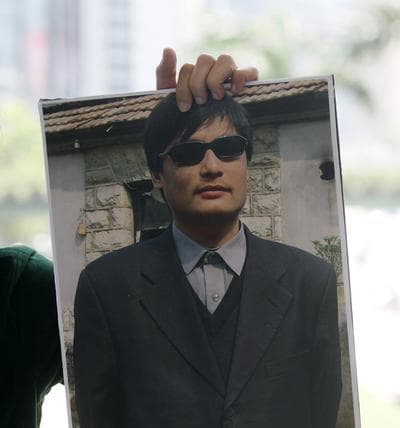Advertisement
Blind Chinese Activist Reportedly Wants To Leave China
Resume
The blind Chinese human rights activist Chen Guangcheng told the Associated Press he now fears for his life and wants to leave China.
That comes just hours after the U.S. Ambassador escorted Chen from the U.S. embassy, where he had sought refuge for 6 days, to a hospital in Beijing. The U.S. said that Chen had made the decision to leave the embassy and stay in China of his own free will.
But Chen now says that U.S. officials told him that Chinese authorities would have beaten his wife to death if did not leave the American embassy.
Chen Conflicted Between Staying and Going
Atlantic Magazine national correspondent James Fallows told Here and Now's Robin Young that the reports are changing every minute, so it's hard to be sure what is happening, but that Chen has said all along that he wanted to stay in China because he knew that dissidents who leave China lose their influence and he preferred to stay and have an impact.
Timing Creates 'Maximum Awkwardness' For Both U.S. and China
Fallows said that Chen's escape was probably not timed to coincide with the talks between U.S. and Chinese official this week, but events today have created "maximum awkwardness for both China and the U.S." forcing both sides into positions that are awkward.
Double Challenge To The Legitimacy Of Communist Party
The Chen case comes on the heels of the Bo Xi Lai scandal, the rising communist party star who was swiftly demoted, his wife held in connection with the murder of a British businessman in China.
Fallows pointed out that until a few days ago, you would have thought that the Bo Xi Lai case was "the most impossibly melodramatic political story you could imagine in modern China, before the blind civil rights lawyer escaping from arrest and making his way to the U.S. embassy in Beijing."
Fallows says these two cases "challenge the legitimacy of the way the Chinese Communist party does business."
The Bo Xi Lai scandal, says Fallows, is a flagrant example of the corruption and crony capitalism that everybody in China is familiar with. In the case of Chen, the reason Chinese people hold him in esteem is because he is not an overthrow-the-government person, Fallows argues, rather Chen is holding the communist government to its own standards.
The American Angle
Here and Now's Robin Young also spoke with Washington Post correspondent John Pomfret in Beijing. Pomfret said that Chen has a remarkable ability to cause controversy, and if he stays in China, "he is going to bump up against the powers in this country."
Pomfret says the compelling details of Chen's escape, a blind man eluding a large security detail and traveling a long distance to the American embassy, have not reached the average Chinese person. That's the opposite of the Bo Xilai case, which is the subject of dinner table conversation.
But Pomfret says the two stories have something in common. Bo Xilai's top lieutenant also escaped and sought shelter with American officials.
"What both these stories show us, is that when the chips are down, Chinese of all stripes, be they a beleagured police officer with a very bad human rights record, or be they a human rights crusader .. when the chips are down they almost always have a tendency to turn to America for help," Pomfret said.
Guest:
- James Fallows, national correspondent for the Atlantic and author of the forthcoming book, "China Airborne"
- John Pomfret, Washington Post correspondent
This segment aired on May 2, 2012.